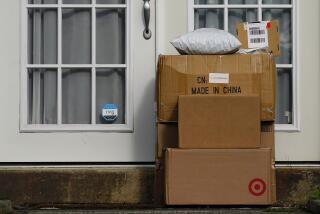Telltale Signs Warn of Pirated Rental Tapes
- Share via
How do you know when you’ve rented a pirated tape?
If you’re like most people, you don’t, according to Mark Harrad, communications director for the Motion Pictures Assn. of America. The discovery isn’t made until they put the tape on their VCR at home and are hit with the poor quality of the sound or the picture--fuzzy and blurred color.
But there are tell-tale signs to look for before you get the tape home, Harrad said.
First, the label of a pirated tape looks handmade or Xeroxed. “If the ink smudges or there’s a black-and-white, typed label on a tape released by a major company, it’s possible the tape was illegally made,” he said.
Second, if the cassette has a brand name--like Scotch or Maxell--prominently displayed, it may be a pirate. Harrad said that you rarely find the tape brand name boldly showing on legitimate cassettes.
Once you get the tape home, there’s another sign of an illegally made cassette--an excess of unused tape at the end. “If the movie is only 103 minutes and there’s 120 minutes worth of tape, you might have a pirated tape,” he said. “The video companies don’t waste tape. When they have their movies duplicated, they’re not going to leave 18 minutes of unused tape. That’s throwing money away. But a pirate would leave that extra tape.”
It’s possible, Harrad added, that some of these signs don’t mean the tape is pirated. The retailer could have replaced a label that had been ruined somehow or the tape could simply be defective.
Chances are that a large percentage of renters have rented a pirated tape. Harrad said that 10% of all video stores deal in pirated tapes at some time. Retailers either make the tapes themselves or buy them from pirates who sell them at bargain rates.
Last year, the MPAA assisted law enforcement agencies in 227 raids, confiscating more than 86,000 pirated tapes. Most of these raids were for violations of the federal copyright law. But Harrad added that more and more charges are being filed against pirates based on state and local laws.
Harrad said this record number of raids doesn’t mean there’s been an increase in piracy. It’s a result, he pointed out, of a larger investigative force and more cooperation from state and local officials, plus more help from consumers and retailers.
If you suspect a retailer of piracy, you can report it to the MPAA anti-piracy hotline ((800) NO-COPYS or (800) 662-6797). MPAA investigators do not immediately swoop down, Harrad said. They will watch suspect stores over a period of time to make sure the complaint is justified.
More to Read
The biggest entertainment stories
Get our big stories about Hollywood, film, television, music, arts, culture and more right in your inbox as soon as they publish.
You may occasionally receive promotional content from the Los Angeles Times.










